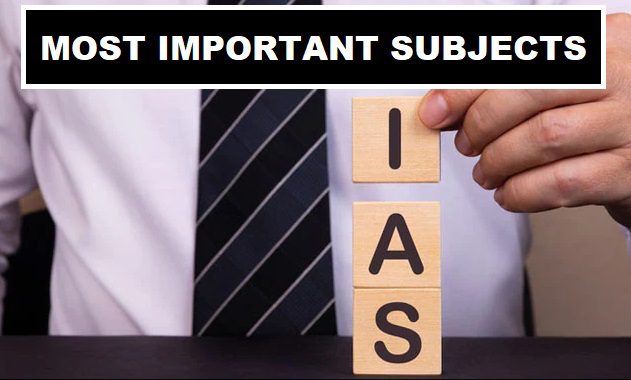The UPSC (Union Public Service Commission) Civil Services Examination (CSE) is one of the country’s highly sought-after and fiercely competitive government exams. UPSC administers it annually to recruit promising candidates for twenty-four government services, including the IAS.
For every UPSC aspirant, two years at Mussoorie is a dream come true, as it is the land that incubates and nurtures the future administrators of the country. Reasons vary– the desire to serve the nation, a proclivity to partake in the nation-building process, an impulse to hook the faculty of power and prestige, etc. In other words, to become an IAS (Indian Administrative Service) officer, you must first qualify for the IAS exam/ UPSC CSE examination with a considerably high rank.
If you are still finding your feet in this all-new enterprise, this article will help you get started. It will attempt to break down the IAS syllabus and filter out the core focus areas and subjects.
IAS Exam Pattern
Before we talk about the subjects for the UPSC examination, let’s look at its structure. The IAS exam consists of three parts:
- Prelims
- Mains
- Personality Test/ Interview
The scope of this article will be limited to the prelims and mains, by virtue of them being written examinations with a comprehensive syllabus.
UPSC Prelims Subjects
UPSC Prelims is the first stage of the IAS exam, which aims to shortlist efficient candidates for the next stage. It has two components:
- General Studies I (100 questions x 2 marks, 2 hours)
- General Awareness
- Indian History and the National Movement
- Indian and World Geography
- Indian Polity and Governance
- Economic and Social Development
- Environment and Ecology
- Science and Technology
- General Studies II (80 questions x 2.5 marks, 2 hours)
- Language comprehension
- Communication and other interpersonal skills
- Problem-solving
- Quantitative Aptitude
- Decision making and analytical ability
- Logical Reasoning and mental ability
- Data Interpretation
All questions will be objective. Also, there will be a negative marking for every incorrect response equal to 1/3rd of the question’s score.
GS II or CSAT (Civil Service Aptitude Test) is a qualifying paper, passing which requires at least 33% marks. On the other hand, the order of merit will govern the GS I cut-off.
UPSC Mains Subjects
You will be eligible to appear for the Mains only if you qualify for UPSC Prelims. UPSC Mains tests the time-bound subjective answering skills and in-depth knowledge of aspiring civil servants in various disciplines. It also assesses the language skills (both English and a regional language) and specialized knowledge possessed by the candidate in any discipline of her/his choice.
In toto, there will be nine papers in this section of the IAS exam:
- Compulsory language paper (any one of the 22 scheduled languages in the eighth schedule of the constitution of India) [300 marks, qualifying paper (25%)]
- English [300 marks, qualifying]
- Essay [250 marks]
- GS I [250 marks]
- Indian and World History
- Indian Culture
- Indian and World Geography
- Indian Society
- GS II [250 marks]
- Indian Polity and Governance
- Social Justice
- International Relations
- GS III [250 marks]
- Science and Technology
- Economy
- Environment and Biodiversity
- Disaster Management
- Security
- GS IV [250 marks]
- Ethics
- Integrity
- Aptitude
- Optional paper I [250 marks]
- Optional paper II [250 marks]
Paper A/ Compulsory Language Paper
The candidates can choose any one of the following languages for this section of the IAS exam:
- Urdu in Persian script
- Telugu in Telugu script
- Tamil in Tamil script
- Sindhi in either Devanagari or Arabic script
- Santali in either Devanagari or Olchiki script
- Sanskrit in Devanagari script
- Punjabi in Gurmukhi script
- Odia in Odia script
- Nepali in Devanagari script
- Marathi in Devanagari script
- Manipuri in Bengali script
- Malayalam in Malayalam script
- Maithili in Devanagari script
- Konkani in Devanagari script
- Kashmiri in Persian script
- Kannada in Kannada script
- Hindi in Devanagari script
- Gujarati in Gujrati script
- Dogri in Devanagari script
- Bodo in Devanagari script
- Bengali in Bengali script
- Assamese in Assamese script
Optional Papers
Candidates can choose any one of the following subjects as an optional subject for the IAS exam (Mains):
- Zoology
- Statistics
- Sociology
- Public Administration
- Psychology
- Political Science and International Relations
- Physics
- Philosophy
- Medical Sciences
- Mechanical Engineering
- Mathematics
- Management
- Law
- Language (any one)
- Urdu
- Telugu
- Tamil
- Sindhi
- Santali
- Sanskrit
- Punjabi
- Odia
- Nepali
- Marathi
- Manipuri
- Malayalam
- Maithili
- Konkani
- Kashmiri
- Kannada
- Hindi
- Gujarati
- English
- Dogri
- Bodo
- Bengali
- Assamese
- History
- Geology
- Geography
- Electrical Engineering
- Economics
- Commerce and Accountancy
- Civil Engineering
- Chemistry
- Botany
- Anthropology
- Animal Husbandry and Veterinary Science
- Agriculture
Conclusion
After analyzing the list of subjects for the UPSC/ IAS exam, we can conclude that its comprehensiveness and vastness complement the cutthroat competition, making it one of the toughest nuts to crack. In this article, we dissected the IAS Exam syllabus and attempted to filter different papers’ core subjects and focus areas. If you’re planning to give the IAS exam, step up your game and hit the books, with this article as a reference to whip up a versatile study plan.

